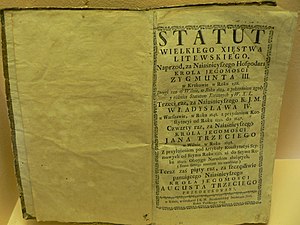Statute: Difference between revisions
No edit summary |
No edit summary |
||
| Line 27: | Line 27: | ||
==References== |
==References== |
||
{{reflist}} |
{{reflist}} |
||
==See also== |
==See also== |
||
*[[Constitution]] |
*[[Constitution]] |
||
Revision as of 16:52, 29 July 2010

A statute is a formal written enactment of a legislative authority that governs a state, city, or county.[1] Typically, statutes command or prohibit something, or declare policy.[1] The word is often used to distinguish law made by legislative bodies from case law and the regulations issued by government agencies.[1] Statutes are sometimes referred to as legislation or "black letter law". As a source of law, statutes are considered primary authority (as opposed to secondary authority).
Before a statute becomes law in some countries, it must be agreed upon by the highest executive in the government, and finally published as part of a code. In many countries, statutes are organized in topical arrangements (or "codified") within publications called codes, such as the United States Code. In many nations statutory law is distinguished from and subordinate to constitutional law.
Alternative meanings
International law
A Statute is a legislative rule given the force of law by consent within a society. The term statute is also used to refer to an International treaty that establishes an institution, such as the Statute of the European Central Bank, a protocol to the international courts as well, such as the Statute of the International Court of Justice and the Rome Statute of the International Criminal Court. Statute is also another word for law. The term was adapted from England in about the 18th century.
Biblical terminology
In biblical terminology, a Statute (Hebrew chok) refers to a law given without a reason. The classic example is the Statute regarding the Red Heifer.
The opposite of a chok is a mishpat, a law given for a specified reason, e.g. the Sabbath laws, which were given because "God created the world in six days, but on the seventh day He rested". (Genesis 2:2-3)
Autonomy Statute
In the Autonomous Communities of Spain, the autonomy statute is a legal document similar in all but name to a state constitution in a federated state. The name was chosen because federalism was a taboo subject when the Constitution of 1978 was approved.
References
- ^ a b c Black, Henry Campbell (1990). Black's Law Dictionary, Sixth Edition. West Publishing. p. 1410. ISBN 0-314-76271-x.
{{cite book}}: Check|isbn=value: invalid character (help)
See also
External links
- TPUC.org, A closer look at Statutes
